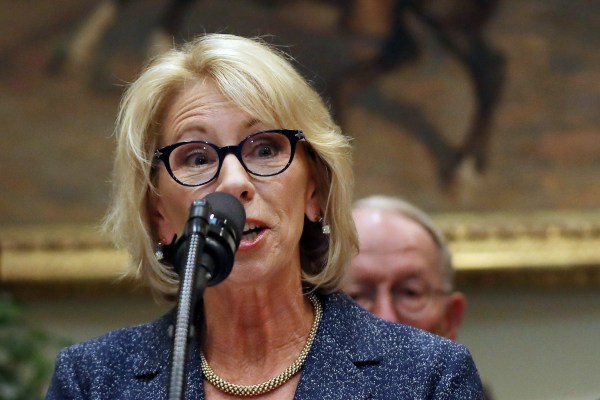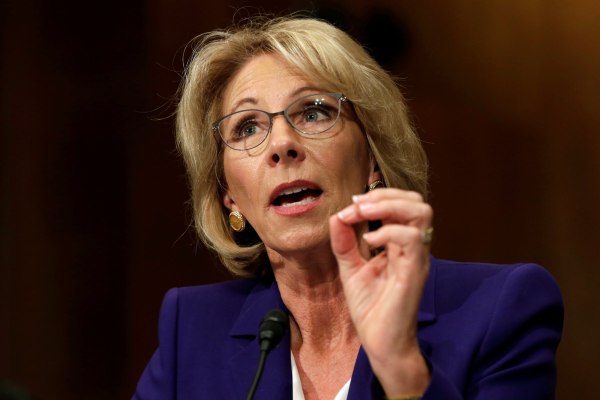President Donald Trump signed an executive order on Wednesday aimed at decreasing the role of the federal government in education while giving states and local school districts more power over decision-making.
Trump called the called order, which directs Education Secretary Betsy DeVos to study federal overreach in education, “another critical step to restoring local control, which is so important.”
“We know that local communities do it best and know it best,” the president said as he stood flanked by DeVos, Vice President Mike Pence, Nevada Governor Brian Sandoval and others.
“Previous administrations have wrongly forced states and schools to comply with federal whims and dictates for what our kids are taught,” Trump said. “The time has come to empower teachers and parents to make the decisions that help their students achieve success.”

DeVos, is already empowered to modify or repeal federal regulations on education. She used this authority in February to withdraw Obama’s past guidance on transgender bathroom protections in public schools.
She now has 300 days, under the new order, to review federal education regulations deemed inconsistent and overly-broad.
The Department of Education’s Bob Eitel is charged with leading a regulatory task force and submitting a report at the end of the 300-day period. Eitel is a former lawyer for Bridgepoint Education Inc., a for-profit education services company which was forced last year to forgive the debts and refund payments to thousands of students, according to the Consumer Financial Protection Bureau.
Adrienne Watson, communications director for the Democratic National Committee, told NBC News that the education order “Doesn’t actually do anything.”
“This EO changes absolutely nothing,” said Watson. “Trump isn’t signing it to actually improve education for American students, he is doing it to put a fake point on the board within his first 100 days because he doesn’t have any accomplishments of significance.”
The order concerns public education advocates and teacher’s associations, who voiced fierce opposition to DeVos during her confirmation hearing in early February.
DeVos is a strong advocate of privatizing children’s education through charter schools (which are publicly funded but privately operated) and school vouchers (which allow parents to use public funds to send children to private schools).
In Michigan, where DeVos has been instrumental in the expansion of privately-run charter schools, parents and educators have said the boom resulted in unregulated schools and poor student performance. There are 300 charter schools in the state, with over 80 percent run by for-profit companies.

“If you’re getting federal dollars to run your charter school, then you should be held to some standard. But that hasn’t happened in Detroit,” Ivy Bailey, president of the Detroit Federation of Teachers, told NBC News in February.
In recent remarks to the National Association of State Boards of Education on Mar. 20, DeVos promised to get the federal government out of the way of school policy.
“We’re going to start by implementing the law as Congress intended,” said DeVos, “Giving you all — state leaders — the freedom and flexibility you deserve.”
The Education Secretary explained that “No two states are identical” at the March meeting.
“The issues and challenges facing West Virginia are different from those of New Hampshire or Oregon,” DeVos said. “We shouldn’t insist the same solution will work everywhere, every time.”

